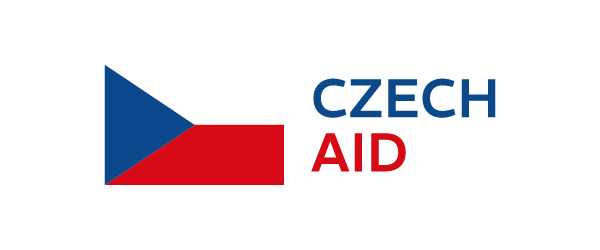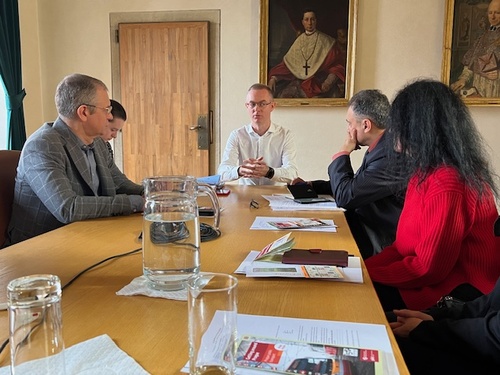

A delegation from Oles Honchar Dnipro National University (DNU) is on a working visit to Charles University in Prague, Czech Republic. The visit takes place within the framework of the cooperation program between the two universities under the project 25-PKVV-UM-004 “Development of Education, Research Activities, and International Cooperation at Oles Honchar Dnipro National University”. The project is funded by the Ministry of Foreign Affairs of the Czech Republic as part of the government grant “Strengthening the Capacity of Public Universities in Ukraine”.
.jpg)
At the invitation of the Czech side, the following representatives of DNU are participating in the short-term internship:
Rector Sergiy Okovytyy; Vice-Rector for Scientific and Pedagogical Work in the field of International Cooperation Viktor Gasso; Dean of the Faculty of Economics Tetyana Grynko; Head of the Department of General and Slavic Linguistics Natalia Dyachok; Head of the Department of Romano-Germanic Philology Inha Kirkovska; Acting Head of the Department of Marketing and Logistics Olha Zinchenko; Associate Professors Svitlana Kaiuk (Department of History of Ukraine), Viktoria Vershyna (Department of Philosophy), Alla Bakhmetieva (Department of Media and International Communication, Head of UNI-Press Information Agency), Olena Khomenko (Department of General Medicine with a Course of Physical Therapy), and Viktoria Kutiepova-Bredun (Department of General and Social Psychology).
The DNU team began its program by participating in a workshop dedicated to the development of lifelong learning in higher education, led by Radek Čajka, Head of the Lifelong Learning Center at Charles University. This university center functions as a dynamic hub for continuous education, professional growth, and personal development. Through interdisciplinary collaboration and innovation, the Center designs a wide range of programs for diverse audiences – from career orientation courses for high-school students who plan to apply to Charles University, to professional development programs for doctors, civil servants, and even senior citizens seeking new skills after retirement. All participants of the programs receive official certification confirming their acquired competencies.
Another key area of the Center’s activity, which Mr. Čajka presented in detail, is the development of custom-designed “Microcredential” courses commissioned by employers. The Lifelong Learning Center is among the pioneers of digitalizing microcredential-based learning, an approach gaining momentum across the European Union. Specialists are working on a unified digital registry of individuals who have completed professional development courses at various institutions. Each course completed to develop specific skills is verified by a microcredential, published on a dedicated platform. This open-access system facilitates employer searches for qualified candidates, helping unify labor market standards across Europe.
.jpg)
.jpg)
Creating a similar microcredential system for Ukrainian employers could become a strategic direction, the workshop participants noted. Such an initiative would be especially realistic if Ukrainian universities join efforts with European partners. For example, DNU is already a member of the European University Association (EUA), which increases its capacity to obtain methodological, financial, and technological support for developing this area.
Digitalization also extends to European educators, who constantly require new skills and competencies. The Lifelong Learning Center therefore develops modern pedagogical standards and training courses for academic staff – both for secondary school teachers and for lecturers at 17 faculties of Charles University and any of HEIs in the country. In this way, the Center firmly establishes lifelong learning as a core principle of the mission of the university.
Rector of DNU Sergiy Okovytyy discussed the relevance of Czech experience for Ukraine with Mr. Čajka. Addressing specific challenges of Ukraine, he emphasized one of the most pressing issues of the country: the reintegration of veterans returning from the front.
.jpg)
– Obviously, the reintegration of our veterans into civilian life will rely on similar lifelong learning programs. We must introduce microcourses that offer retraining opportunities, equipping former soldiers with new skills and preparing them for professions that will be vital for the Ukraine’s recovery of Ukraine, – noted Rector Okovytyy.
He proposed the colleagues from Charles University to join efforts to develop specialized courses aimed at the future employment of Ukrainian veterans in various sectors.
– This will become a top priority for the Czech academic community, as our colleagues are deeply committed to support Ukraine, – assured Radek Čajka, Head of the Lifelong Learning Center.
During further discussions on the return of war veterans to the labor market, Czech and Ukrainian participants considered the idea of creating a joint center that would analyze postwar labor market of Ukraine and design new training programs – not only for veterans but also for a wide range of stakeholders and employers.
Such partnerships and knowledge exchange with Czech institutions will significantly contribute to the development of inclusive and high-quality education in Ukraine, the DNU academic community believes.
.jpg)
Later that day, the delegation also met with the Faculty of Physical Education and Sport project team, where the main discussion topic was the Erasmus+ KA2 project: BALANCE. This initiative will be implemented by experts from eight European universities, including DNU and Charles University. The Czech team was represented by Lenka Henebergová, Vice-Dean for Internationalization, and students Olivia and Jakub. The DNU project is led by Vice-Rector Viktor Gasso.
Erasmus+ Key Action 2 (KA2) projects provide a powerful framework for international collaboration in education, training, and innovation. They foster strategic partnerships between universities, supporting the joint development of curricula, digital tools, inclusive teaching methods, and capacity-building programs.

The BALANCE project focuses on promoting physical and mental health and well-being within academic environment, bringing together partners from different countries to design scientifically based training programs of learning. In particular, the colleagues discussed both their personal motivation for participating in this project and their shared aspiration to inspire young people – to encourage regular physical activity, promote healthy lifestyles, and foster greater awareness of mental well-being.
²íôîðìàö³éíî-àíàë³òè÷íå àãåíòñòâî
Äí³ïðîâñüêîãî íàö³îíàëüíîãî óí³âåðñèòåòó